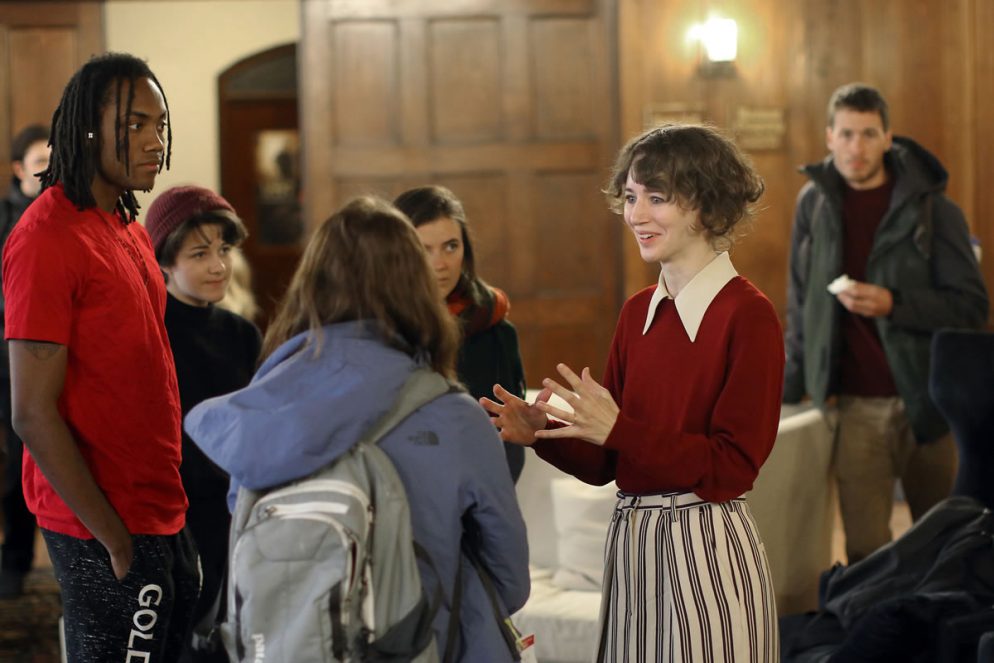Sitting in a circle in Bemis Lounge, a few dozen students gather on couches and armchairs or sit cross-legged on the floor. Acclaimed filmmaker, artist, and writer Miranda July is talking about her creative process, showing role-playing exercises that she uses to get her creative juices flowing. It’s an intimate, candid discussion, with students sharing their concerns and asking their questions about filmmaking, writing, and real life.
“Write it all down!” when an idea hits, July says. “Stop what you’re doing and write it down. You’re not going to remember that idea later.”
On this Thursday morning, it’s a conversation that has this room full of students captivated.

Abigail Washburn ’99 hosted a master class for CC student musicians just a few weeks before the banjo player and singer won her first Grammy last year. Photo by Bryan Oller.
“Miranda July is a feminist, an independent filmmaker, a performance artist, and first and foremost, a writer,” says Tom Lindblade, professor of theatre. His was one of five classes that converged for the morning discussion with July, who was on campus as the keynote speaker at CC’s 2017 Cornerstone Arts Week. “She was able to relate to all the students and help them connect each other’s disciplines,” Lindblade says. “The Block Plan is perfect for such an experience because of its immersion: The guest artist arrives in the second week of the block, when ideas are percolating and being birthed. Miranda was a catalyst for the fruition of these ideas in the last two weeks of the block.”
July’s visit is one of dozens of examples of distinguished scholars who not only visit campus, but also spend time engaging with students. By creating in-residence programs and inside-the-classroom opportunities for artists, scholars, social entrepreneurs, journalists, postdocs, filmmakers, and others, CC is building on the assets of the Block Plan and extending its reach to deeply engage individuals who are experts in their fields and interested in sharing their experiences with students.
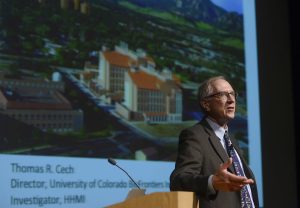
Nobel Laureate chemist Tom Cech visited campus in May 2015, spending an entire day with biochemistry students. Photo by Bryan Oller
“Having the chance to listen to her talk in person about her works and artistic process made me realize that she was not always all-knowing and definitive about her art,” says Alana Aamodt ’18 about July. “While sprinkling in anecdotal stories, experiences, and personal opinions, she spoke passionately about her ideas and inspiration for her art, and by the end
of the class time with her I found myself trusting her — that she wasn’t fake, and that she truly believed in her work.”
Providing time and space for discussions like these to evolve, based on students’ and visitors’ questions or topics of interest, is one of the assets of the block. Focusing on one class at a time enables a depth and breadth that’s just not possible in a different teaching format.
When Nobel Laureate chemist Tom Cech visited campus in May 2015, he spent a full day with biochemistry students.
“We have the class all day. On a semester plan, you have a few hours at a time. There was nothing else the students had to do other than to be part of that time with Dr. Cech,” says Neena Grover, professor of chemistry and biochemistry.
“They could interact formally, informally, and do lunches and presentations. Dr. Cech got to see how bright and capable our students are and our students got to see that they can understand the level of science Dr. Cech presented in the evening,” Grover says. “It’s good for students to learn that level of confidence and build their abilities to make a difference in the world, and to learn to host important conversations in life. This was just the beginning.”
Insights from the Real World
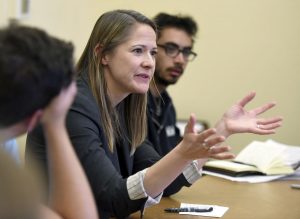
Cate Stetson, an appellate lawyer who has argued before the U.S. Supreme Court, taught a political science class before her lecture to the broader community. Photo by Jerilee Bennett
Interactions like the ones with Cech and July can be the start of students uncovering their passions, or fuel a spark that might not happen if the learning experience didn’t involve these real-life lessons and insights from visiting scholars. Each visitor is able to have an extraordinary impact on the Block Plan, connecting students more broadly to the world of work, seeing how practitioners live, and providing real-world application to concepts discussed in the classroom.
“We can align the goals of the class with the visitors on the Block Plan,” Grover says. “I made sure Cech was coming when I was teaching a biochemistry class. And he had written papers that won him a Nobel Prize with Brenda Bass ’77, a CC grad. Those papers were an important part of readings for the class, for students to see what these discoveries mean. To meet the people who do the work to win the Nobel Prize that you’re learning about is transformative. Students don’t get those kinds of experiences very often.”
They are experiences that can inspire, and they extend across subject matter, with artists, journalists, musicians, and scholars in residence sharing expert insights with students.
“It was an illuminating experience,” says Leandro Montes ’17, a political science major, of Cate Stetson’s visit to his class. “How she was willing to explain things that were basic for her, but for us, as we are just getting started, are very complex.” Stetson, an appellate lawyer who has argued before the U.S. Supreme Court, says that interacting with students helps her think about things differently, and gives students practical insight into how she made decisions throughout her professional journey. She says she’s hopeful the political science class she taught before her lecture to the broader community provided some inspiration and a road map of sorts for those looking to follow a similar path.
“In the kind of law that I practice, there aren’t a great many women who do it. I can talk with these students and say, ‘This is your path forward,’ especially for a female student. I didn’t have that,” says Stetson.
Dana Wolfe, assistant professor of political science, says notable scholars can add timely commentary to classroom discussions. “Having students interact with someone like Stetson brings the material alive,” says Wolfe. “It allows them to consider the real-world consequences of elections and Supreme Court appointments.” Wolfe was able to invite Stetson to lead her classroom discussion soon after the presidential election, helping connect course material to the current political scene.
Finding Their Passion, Elevating Their Craft
Not only do these great minds share insight on stage or at the front of the class through dynamic presentations and panel discussions, but thanks to the nature of the Block Plan these notable experts are also teaching courses, guiding field trips, and offering master classes with CC students.
“It’s so cool that we get this experience to hang out with world-class musicians,” says Jaiel Mitchell ’18, a music major who attended a masterclass with Chris Brubeck, a musician and composer in jazz and classical music. Brubeck and his quartet worked directly with student musicians, providing professional feedback that Mitchell says is valuable.
“It’s awesome to see them play. To get the feedback and have somebody just show ‘this is what I’m talking about.’ He could say that, but that means a whole different thing when he plays it,” she says. “I think that having the practical aspect makes it so much more fun and understandable.”
Abigail Washburn ’99 hosted a master class for CC student musicians just a few weeks before the banjo player and singer won her first Grammy last year. “The thing that keeps it all in check is feeling thankful. Thankful for this minute, this second, for this year, this child I have, for every opportunity, this moment I get to stand onstage tonight at Armstrong Hall and speak to Colorado College students and sing for them and share this art I’ve been creating all these years,” she said during her February 2016 visit to CC. “I’m just thankful. And I think that’s a beautiful thing that I’d love to share with all of these young adults here.”
The Block Plan opens a big enough window to allow students to see into what a life really looks like in one of these fields, for one of these practitioners of their craft. Peter Breslow, senior producer for National Public Radio, has returned for more than one block, teaching as a journalist-in-residence.
“I’ve been in the field for so long, I’ve been in most circumstances, I have many entertaining stories to tell of my adventures,” Breslow says of what he brings to his classes. “You don’t even realize how much you know until you start talking about it and giving examples. I’ve made many, many, many mistakes and if I tell the students about those mistakes, hopefully they’ll make fewer. If I were trying to break into radio, this is a huge opportunity.”
Breslow says the Block Plan allows the course to be “super hands-on and intensive,” sending students out to report a story, and coming back to class the next day with a piece that can be edited and refined, providing students immediate feedback on their work. “It’s very much high volume. I feel that in the beginning, the more you do, we’re not trying
to make them perfect, but hopefully you learn a little each time,” he says. And working so closely with a professional to edit each student’s piece is something Breslow says mirrors what happens daily as a reporter at NPR.
“Hearing their advice on how to give interviews and how to make a story is relevant no matter what I’m doing,” says Ben Bacher ’18. These have been the most valuable takeaways of working with journalists like Breslow, he says.
Charlotte Wall ’19, a Southwest Studies major minoring in journalism and urban studies, says the interaction with professional journalists allows her to ask questions about specific challenges she’s experiencing.
“It’s just a really amazing experience to work with people from the real world, hearing their expertise of working in the business of journalism, which is something I want to do myself.”
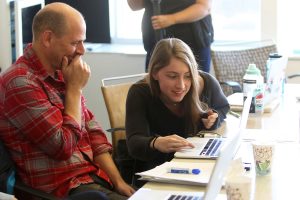
Author Michael Paterniti, whose work has won a National Magazine Award and been nominated for the National Book Award, worked with students as part of CC’s Journalist-in-Residence Program, which aims to raise the profile of nonfiction writing on campus while also bringing some of the nation’s top nonfiction writers to campus. Photo by Tom Kimmell
That sentiment is echoed by many students enrolled in Breslow’s Block 5 course, as well as in class with a second journalist-in-residence, author Michael Paterniti, whose work has won a National Magazine Award and been nominated for the National Book Award. He is co-teaching with Hampton Sides, author, journalist, and editor-at-large for Outside magazine.
“What I’ve tried to do is to share some of that really practical knowledge. These students are hungry, they’re trying to figure out how they fit in the world, they’re trying to find their voices and empowering them and trying to help them do that, become articulate passionate people in the world, is absolutely gratifying,” Paterniti says.
The Journalist-in-Residence Program aims to raise the profile of nonfiction writing on campus while also bringing some of the nation’s top nonfiction writers to campus to teach and participate in a lecture series.
“We’ve had essayists, sportswriters, Pulitzer prize-winning documentarians, even the country’s foremost expert on the Beatles,” Sides says. “These writers are truly masters of their craft. It’s been fascinating to watch them mix it up with the students in the spirited learning environment made possible by the Block Plan. We’re putting CC on the map as a place where serious nonfiction is studied, savored, and celebrated.”
Nurturing Scholars of the Future
As Aamodt, who participated in the class with July while a student in Paterniti’s course, notes, the Block Plan affords opportunities to have direct interaction with notable scholars in ways that are relevant. These experiences provide a deeper understanding of not only the topics of discussion, but also the process and the craft. “The opportunities I’ve had to meet with artists, Skype authors, and be taught by journalists, have refocused the importance of the creative process,” she says. “Understanding the people behind it all forces me to consider the process behind the finished work.”
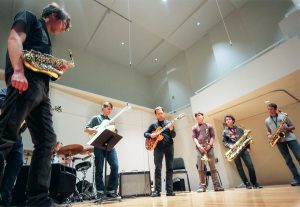
Chris Brubeck, second from left, and his quartet worked directly with student musicians, providing professional feedback, demonstrating concepts, and inviting students to play along. Photo by Niyanta Khatri ’17
Kay Redfield Jamison, professor of psychiatry at Johns Hopkins School of Medicine and a TIME magazine “Hero of Medicine” visited campus to talk about her bestselling memoir, “An Unquiet Mind.” She held an informal lunch talk for psychology and neuroscience majors where they could ask her questions about her work on mood disorders, as well as her own experience with bipolar disorder.
Jamison says she made a commitment relatively early in her career to spend as much time as possible on college campuses and at medical schools talking to students, since onset of mood disorders typically occurs at college age, making the topic particularly relevant to college students. “When ‘An Unquiet Mind’ came out, I asked my publisher if I could gear my appearances more toward students,” she says. “I really enjoy talking to them. They tend to be very interested in subjects related to mood disorders and creativity.”
While Jamison’s expertise is notable, Kristi Erdal, professor of psychology, says it is her ability to communicate about complex terms and ideas that she hopes resonates with her students. “Her ability to communicate with an audience outside of psychology is exceptional,” Erdal says. “Most community members as well as most students know about her popular books more than her published research, showing her ability to communicate very complex psychiatry and psychology into understandable themes, making knowledge about mental illness accessible.”
Making distinguished scholars, their advice, and their knowledge so accessible to students and faculty is one of the ways that CC is “building on the block.” And students and professors aren’t the only ones who benefit.
“I’m going back to my work energized,” July says as she wraps up her morning with students. “I’ve never been a teacher, and these students are so engaged. It feels as if I was talking with younger versions of my peers. Everyone feels like a version of someone I’m going to be working with. I can’t wait to be in a world where I’m influenced by these individuals’ work.”
“These interactions show our students that they’re learning enough in a month that they can do amazing things and they will go on to win the Nobel Prizes in the future,” says Grover. And then one day, maybe to return to CC as block visitors themselves.
